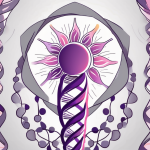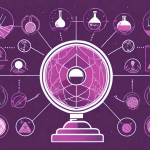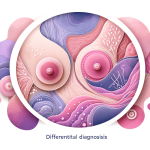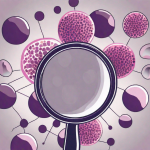This article explores the link between genetics and cancer risk, highlighting the role of gene mutations and family history in predisposing individuals to the disease. It emphasizes the importance of genetic testing and lifestyle changes in managing cancer risk, empowering readers to make informed decisions about prevention and treatment options. Additionally, it discusses the significance of adopting a healthier lifestyle, including nutrition, exercise, stress management, and avoiding harmful environmental factors, in reducing the likelihood of developing cancer. By understanding and addressing these factors, individuals can take proactive steps towards protecting their health and well-being.
Cancer, a disease characterized by the uncontrolled growth and spread of abnormal cells, has numerous risk factors. Some of these factors are within our control, while others, such as genetics, are not. By understanding these risk factors, making lifestyle changes, and considering environmental factors, we can make informed decisions to reduce our chances of developing cancer.
The Link between Genetics and Cancer Risk
One of the key aspects of understanding cancer risk is recognizing the role that genetics plays. While not all cancers are hereditary, certain gene mutations can increase an individual’s susceptibility to the disease.
Genetics is a fascinating field that explores the intricate blueprint of our bodies. Our DNA, the building blocks of life, contains the instructions for how our cells function and replicate. Sometimes, however, errors occur in this genetic code, leading to mutations that can impact our health.
If you have a family history of cancer, it is important to be aware of this potential risk factor. Family history can provide valuable clues about the genetic factors that may be at play. Understanding your family’s medical history can help identify patterns and determine if there is an increased risk for certain types of cancer.
Genetic testing has revolutionized the way we understand and approach cancer risk. By analyzing specific genes, scientists and healthcare professionals can identify mutations that may increase the likelihood of developing certain types of cancer. This information can be invaluable in making informed decisions about prevention, early detection, and treatment options.
However, it is important to remember that genetic predisposition doesn’t necessarily mean developing cancer is inevitable. Our bodies have remarkable defense mechanisms that can help prevent the development and progression of cancer. By adopting a healthy lifestyle, such as maintaining a balanced diet, engaging in regular physical activity, avoiding tobacco and excessive alcohol consumption, and managing stress, we can reduce our overall cancer risk.
In cases where genetic testing reveals an increased risk, consulting with a genetic counselor may provide valuable insights into your individual risk profile. Genetic counselors are trained professionals who can help interpret the results of genetic tests and provide guidance on managing and reducing cancer risk. They can also provide emotional support and help individuals make informed decisions about their healthcare. For individuals at high genetic risk, preventive surgeries (like mastectomy) or medications can be considered as proactive measures, and may be discussed with your healthcare provider.
Remember, knowledge is power. Understanding the link between genetics and cancer risk empowers individuals to take control of their health. By staying informed, being proactive, and seeking appropriate medical advice, we can make informed decisions that may help reduce our risk of developing cancer.
Lifestyle Changes to Reduce Cancer Risk
When it comes to reducing the risk of cancer, adopting a healthier lifestyle is paramount. Making simple yet significant changes can have a significant impact on your overall well-being. Prioritizing a nutritious and well-balanced diet is crucial. Ensuring a diet rich in fruits, vegetables, and whole grains while limiting processed foods and red meats can help protect against certain types of cancer.
Equally important is incorporating regular exercise into your routine. Engaging in physical activities not only helps maintain a healthy weight but also promotes overall wellness. Aim for at least 150 minutes of moderate exercise or 75 minutes of vigorous exercise each week, and consider mixing up activities to keep it enjoyable.
Environmental Factors and Cancer Risk
While genetics and lifestyle choices play a significant role in cancer risk, we must not overlook the impact of environmental factors. Exposure to certain substances and pollutants can increase the likelihood of developing cancer. It is important to be aware of potential carcinogens in our surroundings and take necessary precautions. When possible, try to minimize exposure to harmful chemicals, such as tobacco smoke, asbestos, and pesticides.
The Role of Diet in Cancer Prevention
Our dietary choices can have a profound effect on our susceptibility to cancer. Research suggests that maintaining a healthy weight through a balanced diet can help reduce the risk of various cancers, including breast, colorectal, and prostate cancer. Adding the right nutrients to our diet, such as antioxidants and phytochemicals found in colorful fruits and vegetables, can further strengthen our body’s defense against cancer.
Moreover, limiting the consumption of processed and fried foods, as well as sugary beverages, is essential. These unhealthy options can contribute to obesity and other health conditions that increase cancer risk. By opting for natural, unprocessed foods, we nourish our bodies and decrease the likelihood of developing cancer.
Exploring the Role of Exercise in Cancer Prevention
Beyond its physical benefits, exercise plays a crucial role in cancer prevention. Research suggests that regular physical activity not only contributes to maintaining a healthy weight but also reduces the risk of certain types of cancer, such as breast and colorectal cancer. Exercise stimulates the immune system, promotes healthy hormone levels, and enhances overall well-being.
Engaging in activities like walking, cycling, swimming, or even dancing can make a difference. Find an exercise routine that suits your preferences and make it a regular part of your life. Remember, every bit of movement counts, so strive for consistency rather than perfection.
The Impact of Stress on Cancer Risk
Managing stress is not only essential for our mental well-being but also for reducing the risk of cancer. Chronic stress can weaken the immune system and contribute to inflammation, creating an environment conducive to the growth of cancer cells. Practicing stress management techniques, such as mindfulness, meditation, and engaging in activities we enjoy, can help us effectively cope with stress and protect our long-term health.
Smoking and the Risk of Cancer
It is no secret that smoking is one of the leading causes of cancer and other serious health conditions. The list of cancer types linked to smoking is distressingly long, including lung, throat, mouth, and bladder cancer, among others. Quitting smoking or never starting in the first place is undoubtedly the best decision you can make for your health. Quitting can be challenging, but it is completely achievable. Seek support from healthcare professionals, friends, and family who can provide guidance and encouragement during this journey.
The Role of Vaccines in Cancer Prevention
In recent years, vaccines have emerged as a powerful tool in cancer prevention. Vaccinations such as the human papillomavirus (HPV) vaccine and the hepatitis B vaccine have proven successful in reducing the risk of certain cancers, such as cervical and liver cancer, respectively. Staying up to date with recommended vaccinations not only protects yourself but also contributes to the overall health and well-being of society.
Should You Take Supplements to Reduce Cancer Risk?
When it comes to supplements and cancer prevention, it is important to approach them with caution. While certain vitamins and minerals play a role in maintaining a healthy immune system, it is generally advisable to obtain these nutrients through a varied diet. Supplements should not replace a balanced diet, as they may not offer the same protective benefits that whole foods provide. If you are considering supplements, consult with a healthcare professional to establish the right approach for your specific needs.
By understanding the risk factors associated with cancer and taking proactive measures to reduce them, we can empower ourselves and protect our health. Remember that small changes can make a big difference. Prioritize your well-being, make informed choices, and stay vigilant. Together, we can foster a world where cancer prevention is a priority for everyone.






